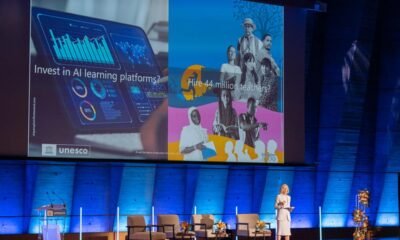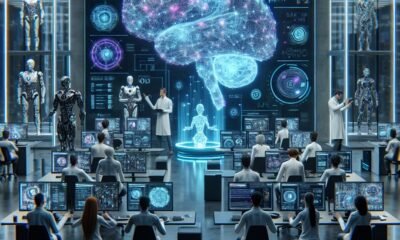Education
Pvt schools bring in AI tools for better evaluation of students | Chennai News

Chennai: When Akansha (name changed) fumbled over a poorly worded maths question in her unit test, it wasn’t her teacher but an AI tool that came to her defence — flagging the flaw in the question and praising her for critical thinking instead of marking her wrong.“The software we are testing pointed out that though the student did not answer the question in a conventional sense, she possessed a critical-thinking ability that surpassed other students. It also pointed out that teachers should have framed the question better,” said Lakshmi Priya, principal, Prasan Vidya Mandir.Increasingly, private schools are purchasing tech and enterprise resource platforms to help teachers understand students’ mindsets better. Primarily set for elementary grades, up to Class V, these tools reduce the workload of teachers and help avoid bias creeping in during evaluation, Uma Kannan, owner, Sri Venkateshwara Institutions, said. “We experimented with a tool called AI Samrat in four of our schools. The improvements were very evident. Manually, it is difficult for teachers to understand where a student lacks if the class strength is high,” she added.Some schools started with a holistic progress card before transitioning into AI tools, which aligns with the vision outlined in the NEP. In this case, the answer sheets are manually corrected and uploaded onto the software. “The software then tells us ways to improve. Parents are also encouraged to provide their inputs for the holistic progress of a child,” said Radha Srikanth, principal, SV High, Arumbakkam.Chitra Ravi, founder of Chrysalis AI, a platform that provides such tools to schools, said there was a need for teachers to update themselves on the tech front to cater to students better. “AI constantly upgrades, and with time, we can even provide tech that can bring in a deeper assessment,” she added.Some schools, such as The Indian Public Schools, have also designed their own AI curriculum instead of purchasing software. Experts are appointed to train teachers in AI models that simplify lessons and draft assessments for students.“While the vision is to be appreciated, over-reliance on technology by teachers can eventually lead to them slacking off. There always has to be a human touch,” said Arumainathan, president, TN Students Parents Welfare Association.
Education
We cannot afford to dismantle Head Start, a program that builds futures, strengthens families and delivers proven returns

The first words I uttered after successfully defending my dissertation were, “Wow, what a ride. From Head Start to Ph.D.!” Saying them reminded me where it all began: sitting cross-legged with a picture book at the Westside Head Start Center, just a few blocks from my childhood home in Jackson, Mississippi.
I don’t remember every detail from those early years, but I remember the feeling: I was happy at Head Start. I remember the books, the music, the joy. That five-minute bus ride from our house to the Westside Center turned out to be the shortest distance between potential and achievement.
And my story is not unique. Every year, hundreds of thousands of children — kids whose names we may never know, though our futures depend on them — walk through Head Start’s doors. Like me, they find structure, literacy, curiosity and belonging.
For many families, Head Start is the first place outside the home where a child’s potential is nurtured and celebrated. Yet, this program that builds futures and strengthens families is now under threat, and it’s imperative that we protect it.
Years later, while training for high school cross-country meets, I’d run past the park next to the center and pause, flooded with memories. Head Start laid the foundation for everything that followed. It gave me structure, sparked my curiosity and built my early literacy skills. It even fed my short-lived obsession with chocolate milk.
More than that, Head Start made me feel seen and valued.
Related: A lot goes on in classrooms from kindergarten to high school. Keep up with our free weekly newsletter on K-12 education.
There’s a clear, unbroken line between the early lessons I learned at Head Start and the doctoral dissertation I defended decades later. Head Start didn’t just teach me my ABCs — it taught me that learning could be joyful, that I was capable and that I belonged in a classroom.
That belief carried me through elementary school, Yale and George Washington University and to a Ph.D. in public policy and public administration. Now, as part of my research at the Urban Institute, I’m working to expand access to high-quality early learning, because I know firsthand what a difference it makes.
Research backs up what my story shows: Investments in Head Start and high-quality early childhood education change lives by improving health and educational achievement in later years, and benefit the economy. Yet today there is growing skepticism about the value of Head Start, reflecting an ongoing reluctance to give early childhood education the respect it deserves.
If Head Start funding is cut, thousands of children — especially from communities like mine in Jackson, where families worked hard but opportunities were limited — could lose access to a program that helps level the playing field. These are the children of young parents and single parents, of working families who may not have many other options but still dare to dream big for their kids.
And that is why I am worried. Funding for Head Start has been under threat. Although President Donald Trump’s proposed fiscal 2026 budget would maintain Head Start funding at its current $12.3 billion, Project 2025, the influential conservative policy document, calls for eliminating the program. The administration recently announced that Head Start would no longer enroll undocumented children, which a group of Democratic attorneys general say will force some programs to close.
Related: Head Start is in turmoil
I feel compelled to speak out because, for our family, Head Start wasn’t just a preschool — it was the beginning of everything. For me, it meant a future I never could have imagined. For my mother, Head Start meant peace of mind — knowing her son was in a nurturing, educational environment during the critical developmental years. My mother, Nicole, brought character, heart and an unwavering belief in my potential — and Head Start helped carry that forward.
My mother was just 18 when she enrolled me in Head Start. “A young mother with big dreams and limited resources,” she recounted to me recently, adding that she had “showed up to an open house with a baby in my arms and hope in my heart.”
Soon afterward, Mrs. Helen Robinson, who was in charge of the Head Start in Jackson, entered our lives. She visited our home regularly, bringing books, activities and reassurance. A little yellow school bus picked me up each morning.
Head Start didn’t just support me, though. It also supported my mother and gave her tips and confidence. She took me to the library regularly and made sure I was always surrounded by books and learning materials that would challenge and inspire me.
It helped my mother and countless others like her gain insight into child development, early learning and what it means to advocate for their children’s future.
Twenty-five years after those early mornings when I climbed onto the Head Start bus, we both still think about how different our lives might have been without that opportunity. Head Start stood beside us, and that support changed our lives.
As we debate national priorities, we must ask ourselves: Can we afford to dismantle a program that builds futures, strengthens families and delivers proven returns?
My family provides living proof of Head Start’s power.
This isn’t just our story. It is the story of millions of others and could be the story of millions more if we choose to protect and invest in what works.
Travis Reginal holds a doctorate in public policy and public administration and is a graduate of the Head Start program, Yale University and George Washington University. He is a former Urban Institute researcher.
Contact the opinion editor at opinion@hechingerreport.org.
This story about the Head Start funding was produced by The Hechinger Report, a nonprofit, independent news organization focused on inequality and innovation in education. Sign up for Hechinger’s weekly newsletter.
Education
Anthropic’s AI Usage Study: Coding Still Dominates

editorially independent. We may make money when you click on links
to our partners.
Learn More
Anthropic has released its third Economic Index, a wide-ranging study of Claude AI usage across countries, US states, and enterprises. The September 2025 report shows coding still accounts for the largest share of activity worldwide, yet education and science are becoming more prominent.
The study also found that automation is increasingly common, with more users trusting Claude to complete entire tasks. Anthropic said the trend offers an early look at how AI is reshaping work and may determine which workers and regions gain the most from the technology.
From debugging code to classroom teaching
Software development remains Claude’s most common use case, making up more than a third of activity globally. But the kind of coding has shifted. New code creation doubled over the past eight months, while debugging declined, suggesting users rely on Claude for more advanced outputs in a single attempt.
Claude AI usage for education and science purposes also expanded. The share of educational tasks rose from about 9% at the start of 2025 to more than 12% by August. Scientific tasks climbed from 6% to over 7%. In contrast, business and financial operations fell from 6% to 3%, and management dropped from 5% to 3%.
Automation vs augmentation in AI tasks
Anthropic tracked not only what tasks Claude handled but also how people worked with the model. Conversations where users gave Claude a job and let it run with minimal input jumped from 27% in late 2024 to 39% in August 2025. For the first time, automation outweighed collaboration overall, making the balance of automation vs augmentation in AI tasks a central trend.

The AI company said two forces may explain the shift: improvements in Claude’s ability to deliver accurate results on the first try, and rising user confidence. That combination has made it more common for people to delegate complex tasks to the AI tool fully, rather than iterating step by step.
Global and enterprise patterns
The US accounted for 21.6% of global usage, far ahead of India, Brazil, Japan, and South Korea. Adjusted for population, smaller high-income countries led per capita. Israel, Singapore, Australia, New Zealand, and South Korea all used Claude far more than expected based on their working-age population.
Within the US, Washington, DC showed the highest per-capita usage, followed by Utah, California, New York, and Virginia. Anthropic said local economies shaped how people used the model, with IT-related requests most common in California and tourism tasks overrepresented in Hawaii.
Enterprise adoption leaned more heavily on automation than consumer use. About 44% of API traffic involved coding, compared with 36% on Claude.ai. Administrative tasks were also frequent, while education and creative work were far less common. Nearly eight in 10 business interactions were automated, showing companies are embedding Claude directly into workflows.
Anthropic said it will continue updating its Economic Index and releasing data to help researchers and policymakers prepare for AI’s economic effects. The findings point to an uneven but accelerating shift: coding still leads, but education, science, and automation are taking a growing share of AI’s early role in the economy.
Read about Anthropic’s recent decision to give Claude power to end harmful conversations and protect “model welfare.”
Education
Top AI stories from Google, OpenAI, Apple, Anthropic, Carnegie Mellon, and MIT — EdTech Innovation Hub

The EdTech Innovation Hub Awards celebrate excellence in global education technology, with a particular focus on workforce development, AI integration, and innovative learning solutions across all stages of education.
Now open for entries, the ETIH Innovation Awards 2026 recognize the companies, platforms, and individuals driving transformation in the sector, from AI-driven assessment tools and personalized learning systems, to upskilling solutions and digital platforms that connect learners with real-world outcomes.
Submissions are open to organizations across the UK, the Americas, and internationally. Entries should highlight measurable impact, whether in K–12 classrooms, higher education institutions, or lifelong learning settings.
Winners will be announced on 14 January 2026 as part of an online showcase featuring expert commentary on emerging trends and standout innovation. All winners and finalists will also be featured in our first print magazine, to be distributed at BETT 2026.
-

 Business3 weeks ago
Business3 weeks agoThe Guardian view on Trump and the Fed: independence is no substitute for accountability | Editorial
-
Tools & Platforms1 month ago
Building Trust in Military AI Starts with Opening the Black Box – War on the Rocks
-

 Ethics & Policy2 months ago
Ethics & Policy2 months agoSDAIA Supports Saudi Arabia’s Leadership in Shaping Global AI Ethics, Policy, and Research – وكالة الأنباء السعودية
-

 Events & Conferences4 months ago
Events & Conferences4 months agoJourney to 1000 models: Scaling Instagram’s recommendation system
-

 Jobs & Careers3 months ago
Jobs & Careers3 months agoMumbai-based Perplexity Alternative Has 60k+ Users Without Funding
-

 Podcasts & Talks2 months ago
Podcasts & Talks2 months agoHappy 4th of July! 🎆 Made with Veo 3 in Gemini
-

 Education3 months ago
Education3 months agoVEX Robotics launches AI-powered classroom robotics system
-

 Education2 months ago
Education2 months agoMacron says UK and France have duty to tackle illegal migration ‘with humanity, solidarity and firmness’ – UK politics live | Politics
-

 Podcasts & Talks2 months ago
Podcasts & Talks2 months agoOpenAI 🤝 @teamganassi
-

 Funding & Business3 months ago
Funding & Business3 months agoKayak and Expedia race to build AI travel agents that turn social posts into itineraries















